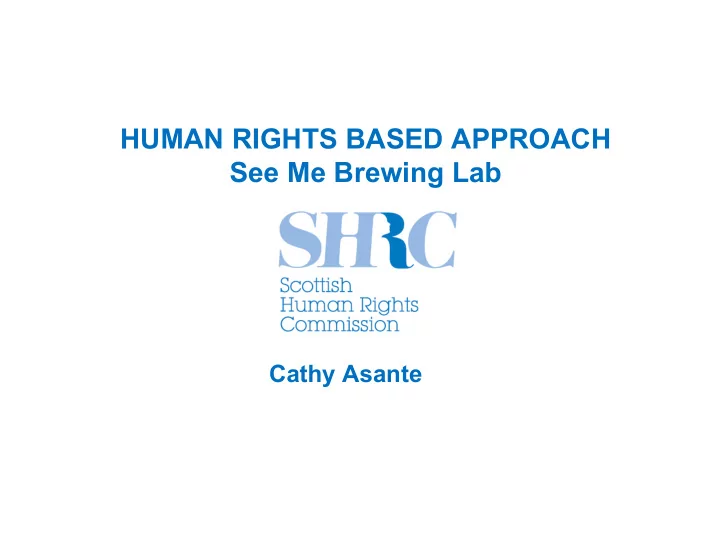

HUMAN RIGHTS BASED APPROACH See Me Brewing Lab Cathy Asante
A Human Rights Based Approach • Empowerment – supporting people to know and claim their rights • Ability – supporting public authorities & others to adopt a human rights based approach • Accountability – increasing accountability for respecting, protecting and fulfilling human rights
PANEL principles – P articipation – A ccountability – N on-discrimination – E mpowerment – L egality
Legality • International treaties (including International Convention on Economic, Social and Cultural Rights & UN Convention on the Rights of Persons with Disabilities) • European Convention on Human Rights (including right to life, prohibition on inhuman or degrading treatment, right to a private home and family life etc.) • Human Rights Act 1998, Scotland Act 1998 (incorporating ECHR into domestic law, s.6 duty on all those providing public function)
Rights protected by the HRA • Article 2 - right to life • Article 3 – prohibition of torture inhuman or degrading treatment or punishment • Article 5 - right to liberty • Article 6 - right to a fair and public hearing • Article 8 - right to respect for private & family life, home & correspondence • Article 9 - right to respect for freedom of thought, conscience & religion • Article 10 - right to freedom of expression • Article 11- right to freedom of assembly & association • Article 14 - Non-discrimination • Article 1, Protocol 1 - right to property • Article 2, Protocol 1 - right to education
Absolute rights • Article 2, ECHR- Right to life Examples: – protection from risk of suicide – Investigating preventable deaths • Article 3, ECHR - Prohibition on inhuman or degrading treatment Examples: – Abuse or neglect – Disproportionate use of force or restraint
Limited rights Article 5 - Right to liberty and security of person • Permitted exceptions: i.e. lawful detention after conviction, lawful arrest or detention for non compliance with order of court or to fulfil obligation prescribed by law, arrest or detention for purposes of bringing before court where reasonable suspicion of having committed a crime, educational supervision, mental illness, subject to deportation or extradition. • Requires: – Information about reason for detention – Trial within a reasonable time or release pending trial – Judicial determination of lawfulness of detention – Compensation • Relevant to immigration detention, sectioning, informal detention in relation to mental health as well as imprisonment.
Qualified rights • The right to freedom of thought, conscience and religion • The right to freedom of expression • The right to freedom of assembly and association • The right to protection of property • The right to respect for private and family life, home and correspondence: e.g. • Autonomy • Privacy • Family life • Physical and psychological integrity
Interference with qualified rights Any restriction must be: • In accordance with the law: have a basis in domestic law, safeguards against arbitrary interference, foreseeable • In pursuit of a legitimate aim: including “the economic well- being of the country”; “the protection of health” • Necessary • Proportionate • Not discriminatory
Interference with qualified rights Proportionality • “Don’t use a sledgehammer to crack a nut.” • What is the problem being addressed by the restriction upon someone’s rights? • Will the restriction lead to a reduction in the problem? • Does a less restrictive alternative exist and has it been tried? • Does that restriction involve a blanket policy or does it allow for different individual cases to be treated differently? • Has sufficient regard been paid to the rights and interests of those affected? • Do safeguards exist against error or abuse? • Does the restriction destroy the basic ideas behind the human rights at issue?
Human Rights in International Treaties UN Disability Convention (examples): • Fundamental principles include participation, human dignity and non- discrimination • Access to justice (article 13) • Right to physical and mental integrity (e.g. Art.16,17) • Right to participate in decision making (e.g. Art.4, 12, 29) • Right to live independently and be included in the community (e.g. Art.19) • Right to personal mobility (e.g. Art.20) International Covenant on Economic Social and Cultural Rights (examples): • Right to highest attainable standard of physical and mental health • Right to adequate housing • Right to adequate food
PANEL principles – an example – P articipation – A ccountability – N on-discrimination – E mpowerment – L egality
Dignity in Care: Care about Rights? Resource pack of films, case • studies and information • Separate sections tailored to different audiences – older people and their carers, providers of care services, policy makers • Distribution to every registered service for older people's care in Scotland and online at www.scottishhumanrights.com/car eaboutrights Extensive training for care • providers • Awareness raising with Regulator Partnership and capacity building • with outreach groups
Care about Rights Evaluation • 90% agreed or strongly agreed that they could see how human rights could improve the delivery of care. • 97% agreed that human rights help ensure more person-centred care. • 97% felt that a human rights approach can help providers develop positive relationships with users and their families.
Getting it right? Human Rights in Scotland, 2012
Scotland’s National Action Plan • A road-map to make all human rights real • International best practice • Evidence based, participatory, independently monitored • Launched 10 December 2013 • Action Groups – Better Culture – Better Lives • Health and Social Care • Justice and Safety • Adequate Standard of Living – Better World
Recommend
More recommend